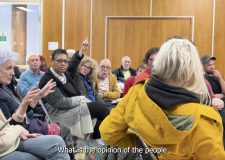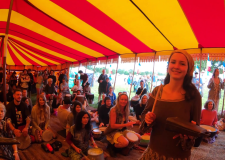Brighton and Hove awarded £2.3m extra to cope with winter surge
Brighton and Hove has been awarded £2.3 million to cope with an expected surge in patients this winter.
The money is part of £500 million promised by Health Secretary Jeremy Hunt to support emergency care.
Brighton and Sussex University Hospitals NHS Trust, which runs the Royal Sussex County Hospital, is bidding for some of the cash.
Although the Accident and Emergency Department at the Royal Sussex may seem to be the obvious place to spend the money, it could be used to fund, for example, rehabilitation beds.
This could speed up the discharge of patients from the hospital, in turn reducing waiting times for patients in A&E.
The news was shared at a meeting of the Brighton and Hove City Council Health and Wellbeing Overview and Scrutiny Committee at Hove Town Hall this afternoon (Tuesday 10 September).
Christa Beesley, the accountable officer at the Brighton and Hove Clinical Commissioning Group (CCG), said: “We have been given by the Department of Health £2.3m extra for this winter.”
Dr Beesley said: “We’re trying to make sure we treat people in the right place. That may not always be in hospital. Sometime it is in hospital but not always.
“When they do need treatment in hospital, we need to get them home quickly.
“The answer isn’t always go to A&E. There may be better places to go.”
She said that a public awareness campaign would encourage people to be an “A&E hero” by not going to A&E unless it was really necessary.
“If you’ve lost the use of your arm, go to A&E,” she said. “If you’ve got a graze that needs checking out, you’re probably better off seeing a nurse at the (Brighton Station) Walk-in Centre.”
She said that the CCG was making better use of rehabilitation beds, including at Knoll House, where only three beds currently remained out of use. They are being brought back into use.
She also said that more use was being made of home care.
And she added: “111 did get off to a really rocky start locally, as you know. But it’s bedding down now. It’s still work in progress but it’s much better.
“General practice needs to step up. We do need more GPs in the town and we do need better access for people. But we (the CCG) can’t commission that.
“We will be looking for volunteers to open up for more hours although they won’t be paid for that.
“I don’t want you to think that GPs in this town aren’t working at weekends and nights, because they are, but they’re not necessarily working in their own practices.
“We’re going to be recommissioning the (Brighton Station) walk-in centre.
“The contract comes to an end in 2015 so we’ll have a new walk-in centre or we may recommission the old one. We may move it next to A&E.
“All these plans are up for discussion.”
One local health chief leader said later: “When the (Brighton Station) walk-in centre was first commissioned, a lot of thought was given to where it would be best located.”
The Queen’s Road site outside Brighton Station was chosen because millions of visitors arriving in town and leaving again go past the premises.
These were the people most likely to benefit from a walk-in centre as they were not registered with a local doctor so would be most likely to turn up unnecessarily in A&E.
The chief executive of the trust that runs the Royal Sussex, Matthew Kershaw, told the same meeting about progress in reducing waiting times for patients in A&E.
Mr Kershaw said: “We’ve made good and considerable progress but it’s still work in progress.
“There have been some parts which remain challenging for us.
“There have been no further breaches of the 12-hour standard. We’d had 24 breaches when we last met.
“During the months of May, June and July we also maintained the other standard – the four-hour standard for patients. We missed it slightly in August.
“We started September a bit better than August but we’re still not quite where we need to be.
“There have been some changes in the department and our performance has reflected that.
“It also reflects the hard work taking place in the hospital and the community.”
He said that although the problems were visible in A&E, they were often the result of problems elsewhere.
Mr Kershaw added: “We’ve also made some new appointments within the emergency department itself and across the hospital which will affect performance in the emergency department.”
He said that there were consultants on duty most of the time even out of hours – at nights and weekends.
He said: “They’re not there all night and they’re not there every night but we do have cover. It’s part of their rotas.
“The number of discharges each day is crucial. There is work to conclude. There are days when the flow – when the number of discharges – reduces.
“And there are days when we need to increase the number of discharges earlier in the day.
“We need to work with our colleagues in the community. It’s not every day but it is a factor some days.
“It’s important that we have the right cover for the sickest patients.
“We also have a dedicated space for mental health patients. As a result people feel safe and appropriate in A&E. That can be a double-edged sword.”
The committee was told that work was taking place to ensure that people with mental health problems did not end up in A&E when they ought to be being treated elsewhere.
Chief nurse Sherree Fagge said that there were more trained nurses and healthcare assistants on duty.
And specialist cleaning staff had been taken on to speed up the availability of beds after patients were discharged.






















